SIBL cares about social causes
Using surplus liquidity properly is the major challenge for banking sector, says CEO of Social Islami Bank
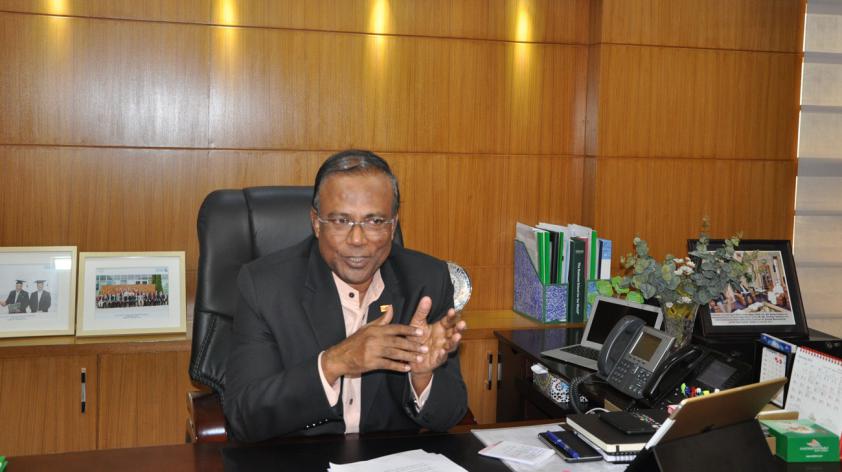
SOCIAL Islami Bank Ltd (SIBL) made a foray into the country's financial sector in 1995 to become not just a lender with a solid financial foundation but also one that cares for society.
“We started with a goal to alleviate poverty, and our initial slogan was to work together for a caring society,” said Md Shafiqur Rahman, managing director and chief executive of the second generation bank. Twenty years later, its goal remains the same, he added.
The bank has been able to contribute to the social and economic development to some extent in its two decades of operation, he said.
Rahman said the bank's vision itself is unique for a financial institution.
Since inception, SIBL reached out to the neglected segments of the population such as the micro, small and medium sized borrowers, and focused on its corporate social responsibility, apart from extending banking services to the formal sector.
The bank was also the first financier in the country to roll out 'cash waqf', where profits are spent on areas approved by Islam.
In its initial days, SIBL lent to businesses as small as makeshift roadside shops. Though those lending activities slowed later on, the bank has revived it under Rahman's leadership.
For a long time now, the bank has been lending to a group of sharecroppers without any collateral in Comilla so they can farm fish during off seasons. These people repay the money within six months of the farming. Today, there are a dozens of such groups, borrowing crores of taka from the bank. These people supply fish to Dhaka, Chittagong and Comilla.
The bank also launched a product, the Family Empowerment Islamic Microfinance Programme, for poor families who do not have any property other than their homesteads.
Under the programme, a cluster is formed consisting of several families, and they are lent Tk 20,000-Tk 80,000 as a group. The bank's field officers guide them and help them market their products.
The product, which was launched last year, was piloted in four branches in northern Bangladesh.
The success in the pilot stage convinced the bank to expand the programme. Now the product is available in 11 branches and outstanding loans in the category amount to more than Tk 2 crore.
“I hope these borrowers will become micro-entrepreneurs in the next one year. Our target is to empower families,” Rahman said.
The product will be available in all of its 50-plus rural branches, as the number of marginalised people is not low in Bangladesh. “If we can implement this programme successfully and expand it, we will be able to contribute to poverty alleviation.”
As part of its social responsibility, the bank works in the areas of health and education, spending about Tk 9 crore in 2015. The amount is increasing every year.
It finances five camps set up for slum children in Dhaka where the underprivileged receive primary education.
The SIBL Foundation has set up a diagnostic and dialysis centre on Green Road, Dhaka, where people get services at lower rates. The bank has a plan to turn it into a full-fledged hospital.
The bank also plans to set up a vocational school for prospective migrant workers so they receive training before going abroad for jobs; it will ensure that they get well-paid jobs.
SIBL is the first Shariah-based bank in Bangladesh to roll out real time online banking. All of its 111 branches are fully online. The bank will open 10 more branches this year.
The bank is now awaiting approval from Bangladesh Bank to roll out its mobile banking service. “Everything is ready to launch it,” said Rahman.
Financial inclusion is the demand of the time, as Bangladesh has the lowest number of banked people above 15 years among the Saarc nations, he said.
“If we can bring the unbanked people under the formal financial system, there will be a transformational change across the country.”
Agent banking is the way to reach out to the unbanked population in the areas where banks cannot go, he added.
SIBL has tied up with Rural Services Foundation, a non-profit organisation of Rahimafrooz Group, to advance its agent banking activities.
Rural Services Foundation has more than 500 outlets across the country, which will work as the agent of SIBL. Seven branches are already working as agent outlets of the bank.
The bank is increasingly moving towards small and medium enterprises, which are considered the bedrock of any economy around the world. Of its total loan portfolio, 22 percent of accounts are of small and medium enterprises. “We are also focusing on SMEs and agro-finance, instead of just on corporate borrowers.”
As of December 2015, the bank's total outstanding loan was Tk 12,959 crore, which was Tk 10,369 crore a year ago. Its operating profit was Tk 522.21 crore last year, up 22 percent from that in 2014.
Rahman, who joined SIBL in 2010 as a deputy managing director and became managing director in 2013, also discussed the challenges confronting the banking sector. How best to use surplus liquidity and get good returns is the major challenge for the sector, he said.
High non-performing loans stand in the way of lowering the interest rate to a single digit as per demands of the business community, he added.
“NPL is a cancer,” he said, adding that their NPL stands at 4.05 percent, much lower than the industry average of 9.5 percent. “Now our target is to lower it to below 3 percent.”
Rahman said the recent scams in the banking sector have put pressures on the sector. The very latest fraud involving ATMs has also shaken people's trust, he added.
“The strengthening of internal control and compliance can curb financial irregularities in the banking sector. If exemplary punishment could be given to the perpetrators, future scams could be averted.”
On the investment scenario, he said businesses will invest money in hopes of making profits. “In order to convince them, they have to be given infrastructure and utility support as well as a strong law and order situation.”
“The way things are now, I think it will improve in the coming months. We have to dispel uncertainty, as investors want lasting stability.”
Rahman began his banking career in 1977 at Sonali Bank. He became its general manager in 2003 and was transferred to Agrani Bank. He was brought back to Sonali Bank again later.
Rahman will retire in January next year when he turns 65.
News:The Daily Star/3-Mar-2016
Banks to destroy cards stuck in ATMs
To issue new debit, credit cards within 7 days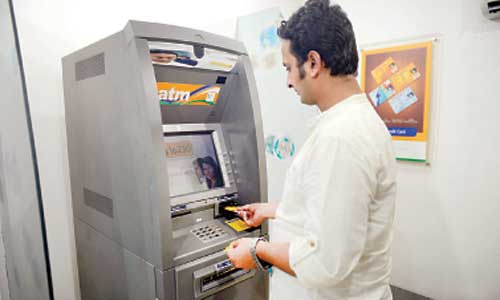
A file photo shows a client using ATM of a private commercial bank in Dhaka. Bangladesh Bank on Tuesday asked scheduled banks to issue new debit or credit card within seven days to a client if his or her card got stuck in the ATMs.
Bangladesh Bank on Tuesday asked scheduled banks to issue new debit or credit card within seven days to a client if his or her card got stuck in the ATMs.
BB officials said that a bank must destroy any debit or credit card which got stuck in the automated teller machines (ATMs) and give the client a new card within seven days after receiving application from the client.
The BB issued a letter to managing directors and chief executive officers of all banks asking them to take measure in this regard in a bid to tackle fraudulent acts.
The BB move came after a number of clients of four leading private banks — Eastern Bank, United Commercial Bank, Mutual Trust Bank and City Bank — had become victims of an ATM scam between February 6 and February 12 as the skimmers withdrew money from their clients’ accounts by forging data of their debit cards.
A BB official told New Age on Tuesday that the banks earlier would not follow any rules about returning the cards to the clients if they got stuck in an ATM. The clients had to wait for long if their cards got stuck in any ATM, he said.
When asked who would pay for the new card, the BB official said that the respective bank would decide the matter.
The official said the BB feared that the skimmers might withdraw money from the ATM booths by using debit or credit cards of the clients which got stuck in the machine.
The law enforcement agency has recently arrested three officials of City Bank and a foreigner on charge of their suspected involvement in the ATM scam.
Following the scam the BB asked the banks to set up anti-skimming device and PIN shield device at their ATMs by March 16 to tackle fraudulent acts.
The BB asked the banks to observe the video footage of their ATM booths accurately on daily basis.
The banks have to take effective measures if they find any doubtful incident in their respective ATM booths. The banks have to inspect their ATM booths on random basis and the inspections reports will have to be placed before the central bank on monthly basis.
The banks have to give training to the guards of the ATM booths so that they (guards) tackle the fraudulent acts. The banks have to give SMS instantly to the clients’ mobile phone after settling any transaction through the ATM booths.
BB for tax-friendly economy
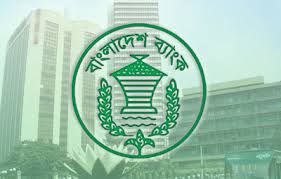 Bangladesh Bank Governor Dr Atiur Rahman today (Wednesday) assured to extend all-out support to the National Board of Revenue (NBR) to make country’s overall tax management tax-friendly. The BB Governor laid emphasis on integrated mechanism in mobilizing internal resources through the key stakeholders of the government. He said there must be proper coordination among auditors general office, BB, NBR and finance ministry to ensure maximum benefits for the country’s growing economy. He was addressing a seminar titled ‘VAT e-payment integration with IBAS and other commercial banks’ in the city on the day. He said recent steps like introduction of RTGS, EFTN, BACH have spurred the momentum of economy through prompt delivery of money transaction between the banks and the customers.
Bangladesh Bank Governor Dr Atiur Rahman today (Wednesday) assured to extend all-out support to the National Board of Revenue (NBR) to make country’s overall tax management tax-friendly. The BB Governor laid emphasis on integrated mechanism in mobilizing internal resources through the key stakeholders of the government. He said there must be proper coordination among auditors general office, BB, NBR and finance ministry to ensure maximum benefits for the country’s growing economy. He was addressing a seminar titled ‘VAT e-payment integration with IBAS and other commercial banks’ in the city on the day. He said recent steps like introduction of RTGS, EFTN, BACH have spurred the momentum of economy through prompt delivery of money transaction between the banks and the customers.
Wasif Ali Khan, Deputy Managing Director & head of Chittagong region of National Bank Limited inaugurating the shifted Hathazari branch by cutting ribbon at Foyez Shopping Center, Ramgor Road, Hathazari' recently. Md Mamnur Rashid Molla, Manager of Khatun
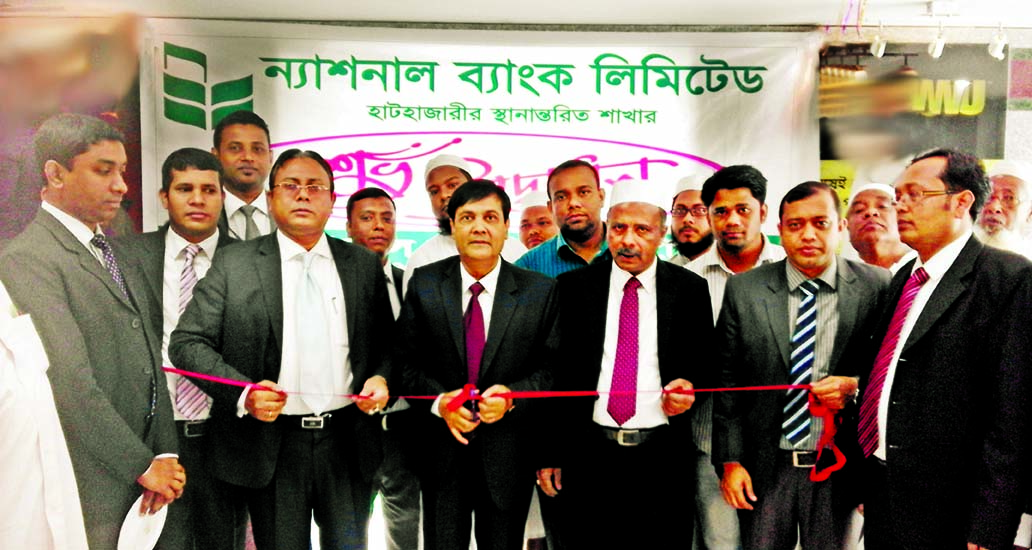 Wasif Ali Khan, Deputy Managing Director & head of Chittagong region of National Bank Limited inaugurating the shifted Hathazari branch by cutting ribbon at Foyez Shopping Center, Ramgor Road, Hathazari\' recently. Md Mamnur Rashid Molla, Manager of Khatu
Wasif Ali Khan, Deputy Managing Director & head of Chittagong region of National Bank Limited inaugurating the shifted Hathazari branch by cutting ribbon at Foyez Shopping Center, Ramgor Road, Hathazari\' recently. Md Mamnur Rashid Molla, Manager of Khatu
BB for strengthening water and energy efficiency investment
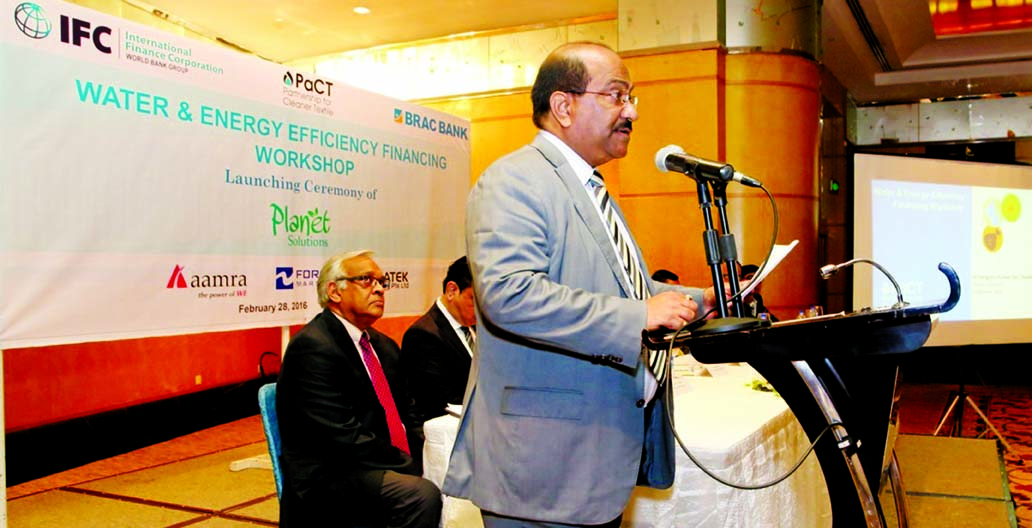 Deputy Governor of Bangladesh Bank (BB) SK Sur Chowdhury addressing a workshop on Water and Energy Efficiency Financing as chief guest at a local hotel on Sunday. Mohan Seneviratne, Programme Manager, PaCT (Partnership for Cleaner Textile) of the IFC, We
Deputy Governor of Bangladesh Bank (BB) SK Sur Chowdhury addressing a workshop on Water and Energy Efficiency Financing as chief guest at a local hotel on Sunday. Mohan Seneviratne, Programme Manager, PaCT (Partnership for Cleaner Textile) of the IFC, We
Economic Reporter :Deputy Governor of Bangladesh Bank (BB) SK Sur Chowdhury has given emphasis ".... mechanisms to capture the opportunities for water and energy efficiency investments need to be created or strengthened," BB Deputy Governor Sur Chowhury said while addressing at a workshop on Water and Energy Efficiency Financing as Chief Guest at a local hotel on Sunday. The workshop, titled 'Water & Energy Efficiency Financing', organized by the Partnership for Cleaner Textile (PaCT) programme of the International Finance Corporation, World Bank Group, addressed some of the key issues in increasing overall financial flows to the sector through innovation in financial product offering and, market development. "For water and energy efficiency investments to be made, water and energy efficiency concepts must be marketed to enterprises, and specific projects must be identified, designed, and appraised," the Deputy Governor explained.Despite the variety of sources for financing energy efficiency projects, it is clear that ultimately the key source of sustainable and sizable flows of finance in most countries is the local banking sector, he observed.He also said water efficiency is an investment in future service reliability, environmental stewardship and economic viability."Greater energy efficiency is the key for shifting country development paths toward lower-carbon economic growth. Especially in developing countries and transition economies, vast potential for energy savings opportunities remain unrealized even though current financial returns are strong," Sur Chowdhury noted."So, innovation is must! Diversifying and innovating newer financing modalities and financial instruments for water and energy efficiency viz-a-viz sustainable sectors will give the banks and financial institutions an added advantage," he added.He also said the time has already come to make the banks sustainable to make the financial system sustainable. "Definitely, the banks have to make profit, but the profit has to be sustainable.""We're ready to give our hand of cooperation and support as usual to all relevant stakeholders for sustainable development," the Deputy Governor noted.He also mentioned that the central bank of Bangladesh has already started working to upstream the sustainable finance mechanism for future.The main objective for arranging the workshop was to support financial institutions and technology service providers in promoting water and energy efficiency products and services for the textile industry in Bangladesh. Among others, Mohan Seneviratne, Programme Manager, PaCT (Partnership for Cleaner Textile) of the IFC, Wendy Werner, Country Manager of the IFC and Selim R F Hussain, Managing Director and Chief Executive Officer of BRAC Bank Limited spoke on the occasion.
News:New Nation/2-Mar-2016


